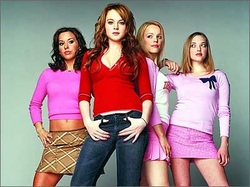
Dying to Be Cool
Some teens are willing to risk everything to boost their popularity. For whatever reason, these kids didn’t have the money, fancy car, cool clothes, rockin’ attitude, or whatever it was that would elevate their social standing. There’s something missing inside that begs for attention. These teens see the cool kids and are jealous of how they get loads of attention wherever they go, seemingly without even trying or caring about it. It’s as easy as breathing to them and the teens who are jealous of that attention... are dying to get it. The main question raised in this scenario is, how far are they willing to go to achieve this level of status?
Some teens are willing to risk everything to boost their popularity. For whatever reason, these kids didn’t have the money, fancy car, cool clothes, rockin’ attitude, or whatever it was that would elevate their social standing. There’s something missing inside that begs for attention. These teens see the cool kids and are jealous of how they get loads of attention wherever they go, seemingly without even trying or caring about it. It’s as easy as breathing to them and the teens who are jealous of that attention... are dying to get it. The main question raised in this scenario is, how far are they willing to go to achieve this level of status?

The movie that comes to mind for the Dying to Be Cool sub-genre is the R-Rated extreme party romp, Project X. The story follows three outcast friends on a mission to throw the ultimate party so they can ‘change the game’ and make a name for themselves. Thomas (Thomas Mann) is convinced by his best friend, Costa (Oliver Cooper), to throw a party at his parent’s house while they’re gone for the weekend. Costa in true troublemaker fashion, uses his friend’s resources, a la parents house, to advance his own personal desires. Thomas’ dad is more of an aloof parent and thinks his son is a loser, so he’s sure nothing will happen while they’re away. Meanwhile, Costa posts the party invite online and the party grows from a small gathering into over 1,500 partyers.

During the party, Thomas is constantly worried that things will get out of hand, but when he tries to take control, he stops himself because teens applaud him, including a popular girl he likes, Alexis (Alexis Knapp). With inhibitions running wild, Thomas reveals his affection for long-time friend, Kirby (Kirby Blanton), by sharing a kiss with her, but problems with the house continually arise and pull him away. As the party spirals more and more out of control, Costa reassures him that everything will be fine and he’s doing it for Thomas to become more popular. The dilemma here is that as Thomas’ status rises, so too does the risk to his parents home due to the partying. As the audience, we wonder if he will be responsible enough to respect his parents house or serve his own self-interests in becoming known for throwing a killer party.

This film is possibly one of the first teen comedies to be shot in what is known as “found footage” style, where the cameras appear to be recorded by one of the characters. It’s a reality TV style that helps create more realistic moments of drug use, drinking, and sex; elements that were necessary in showing how extreme and out of control a party could get. In this instance, the comedy comes from seeing how much debauchery and destruction could occur in one night.
A movie like this became enormously successful because of the premise in seeing an out of control house party that police couldn’t shut down. It was the ability for teens to live out a fantasy through the main character and see the possibilities that might occur if a real-life party ever got that out of hand. A tagline that ran in big letters across one of the Project X posters read, “The Party You’ve Only Dreamed About.” And, for teens who love to party, it was the ultimate escape.
- Excerpt from the Joe Lam's book Teenage Dreams: How to Make a Successful Teen Comedy Movie, which offers a variety of Teen Comedy Sub-Genres such as:
A movie like this became enormously successful because of the premise in seeing an out of control house party that police couldn’t shut down. It was the ability for teens to live out a fantasy through the main character and see the possibilities that might occur if a real-life party ever got that out of hand. A tagline that ran in big letters across one of the Project X posters read, “The Party You’ve Only Dreamed About.” And, for teens who love to party, it was the ultimate escape.
- Excerpt from the Joe Lam's book Teenage Dreams: How to Make a Successful Teen Comedy Movie, which offers a variety of Teen Comedy Sub-Genres such as:
- Coming of Age
- First Love
- Rivalry
- Rebellion
- Need to Succeed
- Sex Crazed
- Back to School
- Dying to Be Cool
- Like Me or Not
- Dark Satire


 RSS Feed
RSS Feed
